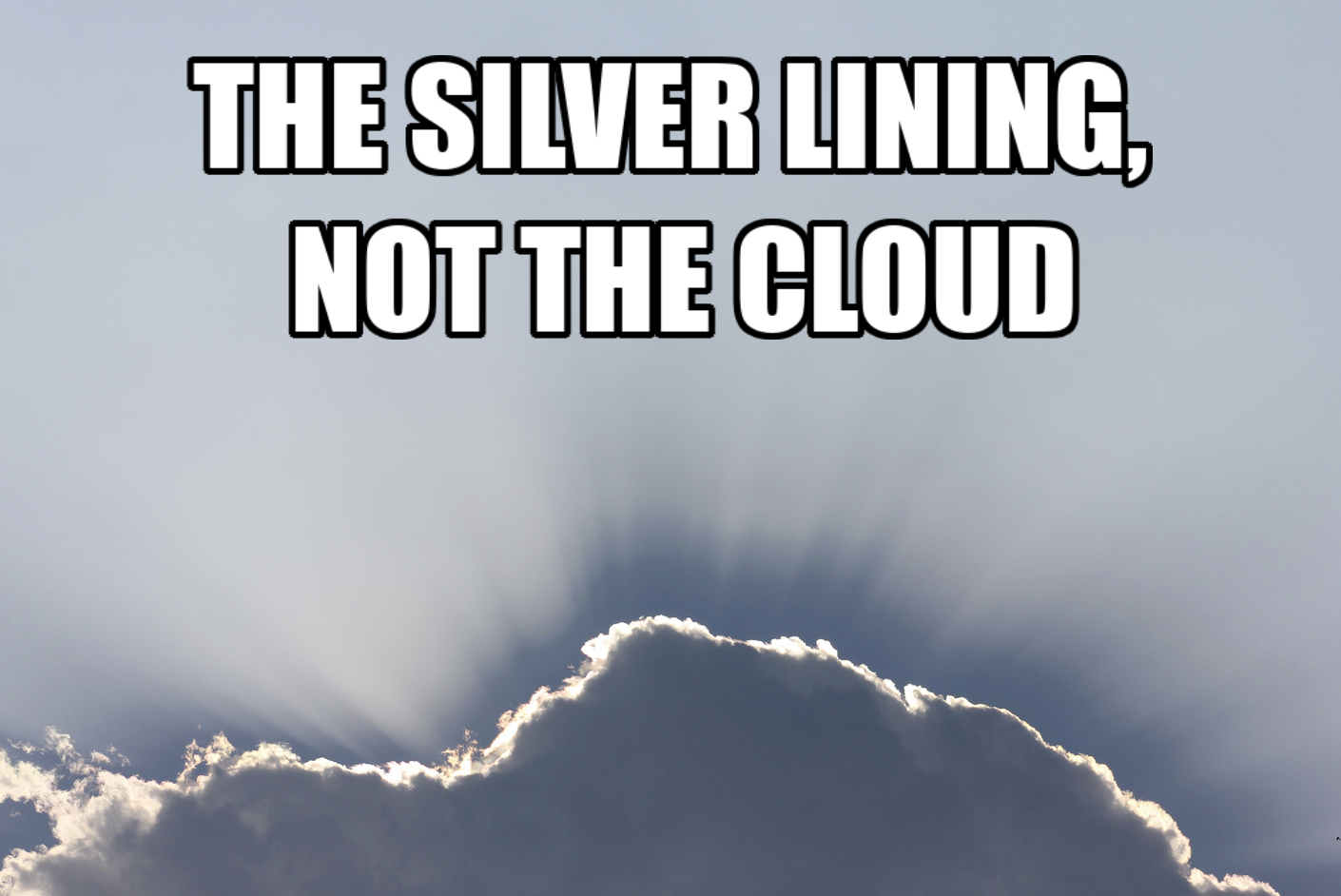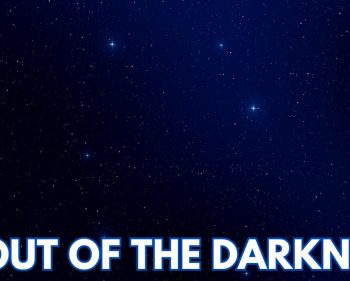THE SILVER LINING, NOT THE CLOUD

You know, Jewish memory works in funny ways. Ask someone what they remember about a good meal, and they’ll say, “The soup was too salty.” Ask them about a great vacation, and they’ll say, “It rained on Tuesday.”
Why don’t we say – the food was great, the vacation was fabulous? We have a knack for focusing on the negative even when there’s plenty of positive to focus on.
So – just for a moment – I want you to shake off your natural instinct for remembering the negative, and to think about all the positives in your life. And then we’re going to use that as the trigger for teshuva on Rosh Hashanah and Yom Kippur.
Wait, rabbi – what are you talking about? Using positive stuff as the trigger for teshuva? How does that make sense? Isn’t teshuva about being broken, humbled, and shaken up? Isn’t it the curses and the problems and the challenges of life that push us to repent – not the blessings?
Actually, no… and it’s in Parshat Nitzavim. Parshat Nitzavim comes straight after the Tochacha in Ki Tavo – the list of terrifying curses that make your hair stand on end.
And Nitzavim has some curses of its own too. But then, at the beginning of the next chapter, the Torah throws us a curveball. It’s in the pesukim that discuss the mitzva of teshuva (Deut. 30:1-2):
וְהָיָה כִּי־יָבֹאוּ עָלֶיךָ כָּל־הַדְּבָרִים הָאֵלֶּה הַבְּרָכָה וְהַקְּלָלָה אֲשֶׁר נָתַתִּי לְפָנֶיךָ וַהֲשֵׁבֹתָ אֶל־לְבָבֶךָ בְּכָל־הַגּוֹיִם אֲשֶׁר הִדִּיחֲךָ יְיָ אֱלֹהֶיךָ שָׁמָּה. וְשַׁבְתָּ עַד־יְיָ אֱלֹהֶיךָ וְשָׁמַעְתָּ בְּקֹלוֹ כְּכֹל אֲשֶׁר אָנֹכִי מְצַוְּךָ הַיּוֹם אַתָּה וּבָנֶיךָ בְּכָל־לְבָבְךָ וּבְכָל־נַפְשֶׁךָ.
“And it shall be, when all these things come upon you – the blessing and the curse that I have set before you – and you take it to heart among all the nations where Hashem has dispersed you, and you will return to Hashem and listen to His voice, according to everything that I command you today, you and your children, with all your heart and with all your soul.”
And so it goes on, God promises us that if we do teshuva, everything is going to be ok. But here’s the question: mentioning curses in that context makes sense. If life beats you down, you start thinking, maybe it’s time to change.
But blessings? Since when does winning the lottery make you do teshuva? I’ve never heard someone say to me, “Rabbi, I just got promoted to my dream job, I’m driving a brand new Tesla, and my kids are all honor roll students… clearly I must do teshuva, I must repent – right away!”
The classic answer to this question is that the Torah is describing a sequential narrative: first you get blessings, then they turn sour and the curses set in, and finally, the whiplash wakes you up, and you do teshuva.
But the Shemen HaTov – Rabbi Shmuel Weinberger, the celebrated talmid of the Ksav Sofer, who was Rav in Verbau, Slovakia, and tragically was murdered in Auschwitz – says something far more radical. He says: no, blessings themselves should be the perfect trigger to push you to do teshuva. Ok, so what does that mean?
Imagine everything is going brilliantly in your life. Instead of taking a victory lap, the Torah says that’s exactly when you’re supposed to stop and ask: why me? Am I smarter? Am I holier? Am I kinder?
Or is it that maybe that God is showering me with blessings out of His incredible goodness and kindness. And if that’s true – shouldn’t I be asking mysekf: how can I give something back?
The Chofetz Chaim was once overheard talking to God. This is what the Chofetz Chaim said to God, while he though no one was listening. He said: “Master of the Universe, you’ve given me so much already. You let me write Shmiras HaLashon, to teach the world about Lashon Hara. You let me write the Mishnah Berurah, to give people a one-stop-book about halachot of everyday Jewish life. You’ve given me so much, much more than I deserve – so what can I do for You?”
Now let’s be honest: if any of us wrote a book like Shmiras HaLashon or the Mishnah Berurah, we’d probably expect a medal, and for God to be so happy with us. “Look, God, I did You a favor. I made Shulchan Aruch Orach Chaim readable! You owe me big time.”
But the Chofetz Chaim flipped it around on its head: he saw it as God’s blessing that he had published these books, and those blessings only made him more humble, more grateful, and more eager to give back. “What can I do for you, God?”
And that’s what the pasuk means when it says הַבְּרָכָה וְהַקְּלָלָה – “the blessing AND the curse will come upon you, and you will return to God.” Because blessings can be just as powerful a wake-up call as curses – but only if we choose to see them that way.
There’s a wonderful story about the Kotzker Rebbe. Rabbi Menachem Mendel of Kotzk (1787–1859), the Kotzker Rebbe, was one of the most fiery and uncompromising Hasidic masters. He had no patience for half-truths, or fake piety, or spiritual laziness. His wit was razor-sharp, often sardonic or sarcastic – and his chassidim both adored him and trembled before him.
The Kotzker once asked one of his chassidim: “What’s the worst curse you could give someone?” The chassid thought hard and said, “May you suffer terrible poverty.” The Kotzker shook his head.
Another chassid tried to answer: “May you be sick and suffer from your illnesses.” The Kotzker shook his head again. “No, these are not the worst curses.”
Finally, the Kotzker said: “Do you know what the worst curse is: May everything go well for you – and when it does, you think it’s because of you. Because then you’ll never be the best person you can be.”
The Kotzker was right. That’s the danger of blessings. They can blind us. But, as the Shemen HaTov says, they can also inspire us – if we are present in the moment and see them as an opportunity.
And truthfully, you don’t have to be a chassid in Kotzk to understand this.
I once heard about a man who went for his annual physical, and after all the tests had been done, and the results were ready – the doctor came in with a big smile and said, “Everything looks great, you’re perfectly healthy.”
The man almost fainted. “Doctor, are you sure?” he said, looking worried. “Can you check again? Maybe run another test?”
We’re so used to bad news, that we set ourselves up to respond to it. But good news? We have no idea how to react to it. We don’t know that good news should inspire us to be better people.
But that’s exactly the Torah’s point. Don’t wait for the curse. Let the blessing wake you up.
Here’s the takeaway as we head into Rosh Hashanah and Yom Kippur: most of us, hopefully all of us, are living with extraordinary blessings – we have our health, our family, our community, our freedom, we have material stability, we have incredible opportunity.
The question is, do we see them as God’s way of nudging us closer, or do we pat ourselves on the back and say, kochi v’otzem yadi – it’s my brilliance that did it? Because we need to seem our blessings as triggers to ask God: “Why me? And if it’s me, what can I do for you?”
The Torah’s message is clear: don’t wait for curses. Use your blessings as the catalyst for teshuva.
So here’s my blessings for all of us as we walk into Rosh Hashanah and Yom Kippur:
May we not need curses to wake us up.
May we not need trouble or tragedy to bring us back to Hashem.
Instead, may we learn to look at the blessings — our families, our health, our community, even the small everyday gifts that we take for granted — and let them shake us awake.
Because when you think about it, that’s the ultimate teshuva: to be so overwhelmed with gratitude that you say, like the Chofetz Chaim, “Ribbono Shel Olam — You’ve given me so much. What can I do for You?”
And if we can enter the Yamim Nora’im with that perspective — not grumbling about the soup being too salty, or the rain on Tuesday, but focused on all the blessings God has showered on us — then we’ve already started our teshuva journey.
And who knows? Maybe this year, when we stand before God on Rosh Hashanah, He’ll look at us and say: “Ah — they finally got it. They finally learned to repent from blessing, not from curse.”
That would be the sweetest blessing of all.
(Adapted from a Dvar Torah by Rav Yissocher Frand)

